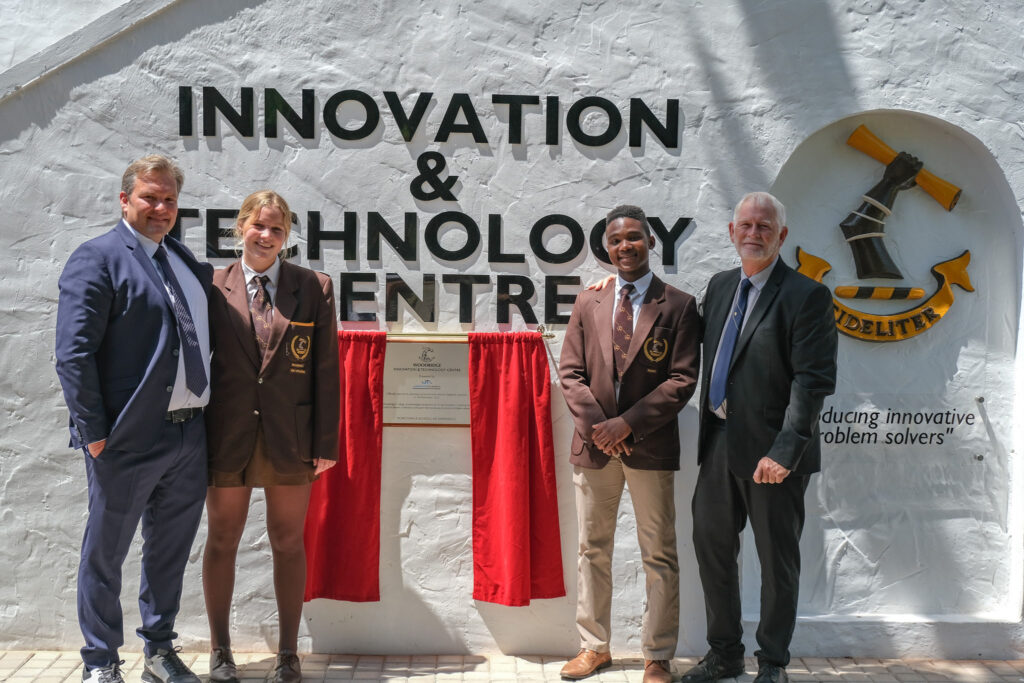
SOUTH Africa’s newest educational technology centre has opened and is focused on readying pupils for a world transformed by the Fourth Industrial Revolution (4IR).
The centre, which opened this week, features the latest 4IR technologies and will give pupils hands-on, practical experience in working with collaborative robots, coding and programming, 3D printing and modelling, artificial intelligence, the Internet of Things, drone flying and more.
In an industry-education partnership, acclaimed tech company Jendamark Automation joined forces with one of South Africa’s top independent schools, Woodridge College, to develop and equip the Woodridge Innovation & Technology Centre for pupils.

“Exposing pupils to this type of advanced and integrated technology, which is focused on the Fourth Industrial Revolution, will give them the skills and the competitive edge when entering university or joining the workforce,” said Woodridge College headmaster Derek Bradley, adding that the equipment and expertise provided by Jendamark would allow the centre to meet the goals the partners had jointly set.
Real-life applications were a critical aspect when teaching children about a subject, said Bradley.
While keeping a curriculum up to date with the rapid revolution of the working world was challenging, a focus on skills development was key to navigating change, according to Dr Catherine Logie, Woodridge deputy head for academics.
“If one has a curriculum which not only focuses on content but also on skills, then the content becomes a means to an end and pupils are able to adapt and learn as environments change. Having partners outside the fields of education gives teachers the opportunity to learn new things and adapt their lessons.
“A tech centre is not just about coding or robotics but is about having a space which is equipped differently from a standard classroom where pupils and teachers can explore parts of the curriculum. Already the Physical Sciences department is looking at how they can utilise the space and some of the equipment for expanding their practical work on motion. The new centre will generate renewed excitement around learning,” Logie said.
Head of the Information Technology department at Woodridge, Nicholas Kock, said it was exciting for the school to be leading this education revolution and expanding its digital programme offering.
“In addition to our IT, CAT and Computer Literacy programmes that we currently offer in our existing computer labs, the new tech centre allows us to implement Fourth Industrial Revolution technologies and 21st century skills.”
Kock said these skills included problem-solving, computational thinking, awareness of the social and ethical issues around technology as well as its responsible use.
“Our children are extremely fortunate that we have partnered with Jendamark, as this is an organisation that is using the latest technology in their production lines and in their research and development.”
Jendamark’s operations director, Siegfried Lokotsch, said the company decided to partner with Woodridge College as they shared the view that learning should take place through practical experience, not just classroom theory.
“We have a passion for education and have a long-term vision to provide relevant learning and ed-tech to pupils. While there is a rise in demand from parents for schools to offer robotics and programming, we also realised that they don’t really understand what it’s all about. So, we are also trying to educate parents and children about the real-world relevance and possibilities of 4IR.”
Lokotsch said if the Woodridge pilot proved to be a success, the company hoped to replicate the model in the future.
In addition to providing on-going tech support and regular equipment upgrades, Jendamark will facilitate tours of its manufacturing plant, where it builds and exports high-tech automotive component assembly systems. Here pupils will see the real-world, industrial applications of what they are learning in action and be inspired to explore possible career options, such as engineering or software development.
Lokotsch said Jendamark’s ODIN technology team would collaborate on the curriculum offered to ensure that it remained relevant to the needs of industry.
Woodridge Trust chairperson Andrea Puggia said this initiative was in line with the strategic plan for the school which had been commissioned some 18 months ago.
“Two key strategic goals that emerged from this plan were the need to provide a relevant curriculum that produces innovative problem solvers, and to ensure Woodridge has the infrastructure to meet the strategic needs of the school. “This project embodies both goals and it is most gratifying to see the strategic plan being integrated into the fabric of the school,” said Puggia.